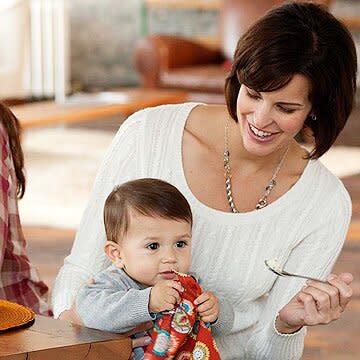Do Your Eating Habits Affect Your Baby's?

Heather Weston
There has been a lot of bad news about how junk food, soda, and other sugar-sweetened beverages are making children fat, but too often the discussion leaves out the role parents play in their children's weight problems. A new study on how parents feed their infants finds that many mothers and fathers engage in feeding practices that tend to promote overeating and excessive calorie consumption, resulting in more than 25 percent of 2- to 5-year-olds in the U.S. being either overweight or obese.
Because overweight infants and toddlers often become overweight teens and adults, there is a new focus on how behaviors and eating habits from the earliest months can impact weight gain in the first few years of life.
Feeding Habits to Avoid
Certain feeding styles and practices have been suspected or definitively identified as being associated with obesity risk. On the positive side, when children are exclusively breastfed, they are generally protected against obesity as compared to their formula-fed peers. On the other hand, when families introduce solid foods such as cereal into their babies' diets very early (before 4 to 6 months), their children, who may not yet crawl and are far from learning to walk, consume too many calories for their physical activity level and often become overweight. Similarly, children who are introduced to fruit juice and sweetened drinks at a young age also have an increased risk of becoming overweight or obese.
Pressuring a child to eat is also an unhealthy habit. When infants are pressured to feed, either by being encouraged to finish a bottle even when they have lost interest and appear satisfied, or by propping the bottle so it remains in place for continual suckling, the risk of obesity increases.
It's better when parents and caregivers develop a more responsive feeding style in which they actively look for signals that their toddler or infant's hunger has been satisfied, and stop feeding at that point. Children fed this way are much less likely to develop weight problems.
Researchers at the University of North Carolina examined the feeding practices in 863 families when children were only 2 months old. Researchers wanted to know how common certain feeding practices were among parents at this young age, and whether they varied across racial/ethnic groups. Their findings may help doctors counsel parents at well-child visits about avoiding overfeeding their children, and they also identify the kinds of families likely to engage in high-risk feeding behaviors.
Questions to Consider
What did you feed your baby initially? Breast milk exclusively, breast milk and formula, or formula only? Breastfeeding tends to reduce the risk of overeating.
When did you introduce solid food (including the addition of cereal to the bottle)?
Did you encourage your baby to finish the whole serving in his or her bottle or did you let the baby decide how much to eat?
Do you often watch TV while feeding your infant? This practice can make parents less likely to notice their child's feeding cues. They may not notice when their baby or toddler is full or when he needs to be burped.
How much time does your baby spend in front of the TV? The American Academy of Pediatrics discourages children under age 2 years from watching TV.
Is the television on as background in the room as you interact with your infant? Television tends to distract caregivers and prevent meaningful social and language-based interactions with infants.
How much tummy time does your child have? When your infant lies on her belly and plays while supervised by an adult, it allows her to practice using different muscles to lift her head and move her arms and legs and chest than when lying on her back. Tummy time is especially important because it is recommended that infants be placed to sleep on their backs, not on their tummies, to avoid the risk of sudden infant death syndrome.
Recommendations
While further study is needed to better understand the relationship between feeding in early infancy and becoming overweight later in life, it is clear from these results that parents and health care providers can make beneficial changes immediately that would reduce infants' caloric intake and increase their activity levels.
It can really pay off to make an effort to focus on your baby as he nurses or bottle feeds. So can encouraging tummy time and other activities, and introducing fruit juices and solids only once it is developmentally appropriate. By following these tips, you can reduce your child's risk of obesity and set the stage for a healthier childhood, adolescence, and adulthood.
Discuss your baby's diet, activity needs, and TV exposure with your health care provider. He or she can suggest ways to avoid the feeding pitfalls discovered here, and give you ideas that may start infants on the road toward good nutrition and good health.
This article originally appeared on The Doctor Will See You Now.
All content on this Web site, including medical opinion and any other health-related information, is for informational purposes only and should not be considered to be a specific diagnosis or treatment plan for any individual situation. Use of this site and the information contained herein does not create a doctor-patient relationship. Always seek the direct advice of your own doctor in connection with any questions or issues you may have regarding your own health or the health of others.
